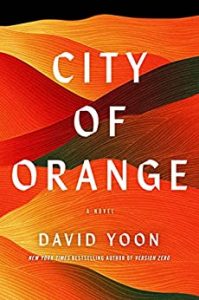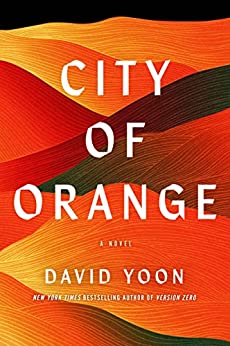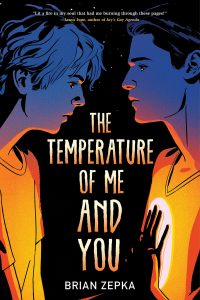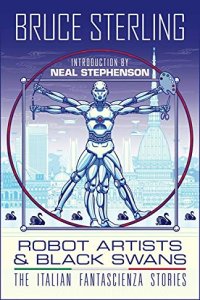Maya C. James Reviews City of Orange by David Yoon
 City of Orange, David Yoon (Putnam 978-0-59342-216-8, 352pp, $27.00, hc) May 2022. Cover by Kristin Del Rosario.
City of Orange, David Yoon (Putnam 978-0-59342-216-8, 352pp, $27.00, hc) May 2022. Cover by Kristin Del Rosario.
What is an apocalypse if no one is around to care about it?
David Yoon’s City of Orange tackles this difficult reality in a character-driven post-apocalyptic tale of a man who refuses to remember life’s difficult moments, or to bear witness to the current state of a dying world. We begin with a nameless protagonist waking up in an empty, toxic-white landscape, with a head injury and no other human beings around. He’s not being pursued, but he’s alone, vulnerable, and fearful of what comes next. Phantom images of a child and a woman he loved haunt him as he searches for food, water, and shelter in a strange snow-globe of an ending world. Equally interesting and even more amusing, memories of his mildly inappropriate, loyal doomsday-prepping friend, Byron, who always warned him of proper survival methods in case of a sudden apocalypse.
The novel is less a harrowing apocalypse than a series of rusted, barren landscapes constructed by a protagonist who has no memory of who he is or where he’s going. Accompanied by strange images of a life he once lived, the nameless narrator of this post-apocalyptic America is seemingly the last survivor. And he doesn’t seem to care.
This standalone SF novel is told through a series of hazy images from the mind of a sick and grieving man who is just going through the motions of survival. He does not seek to understand himself in this new world, as made evident by his refusals to think of past memories. As the novel progresses, it becomes evident that the main source of conflict is not whatever apocalyptic event happened, or the risk of violence and starvation, but the nameless protagonist’s inability to wrestle with the moments that brought him to his unfortunate situation. The last pages of the book pick up pace in a tremendous way, offering unexpected plot twists and meaningful reflections on what apocalypse means for our own lives and sense of self.
The sparseness of the novel’s landscapes is striking – objects as mundane as a Christmas tree, or crows that go missing in a matter of hours, are intensely scrutinized through clever prose and obsessive detail. Even a lack of a name can make the novel feel sparse and tedious. However, Yoon compensates for this with a wry sense of humor and sarcasm. The main character is far more relatable than gun-strapped characters that go off seeking heroic adventures. He can barely open a can of chili, but he can entertain himself (and readers) for days on end. As we become comfortable with the rhythm of the character’s discovery, a new character enters, or another change ensues. It’s an unexpectedly dynamic read for a novel so focused on memory and forgetting.
Yoon’s writing is intimate – we witness the unnamed character reconstruct the life he once lived, while also pushing away very particular memories that seem to be ones of joy and happiness. Contrasting with most characters afflicted with amnesia, the character does have access to these memories, but seemingly rejects them in favor of easy to digest slices of life. Apart from memories of Byron, it becomes evident that he’s somewhat of an unreliable narrator, even if incredibly funny and interesting. The reader is kept in the dark about his past for quite a long part of the novel. Part of the novel’s mystery is unraveling why the protagonist is unwilling to allow these memories to resurface and inform his next steps, particularly when he seems so distraught without them.
Yoon’s writing is funny, too – the character is obviously not some fit man ready to survive the world. In fact, it’s unclear why he even is the sole survivor in the beginning parts of the novel, as he barely seems to be able to find water, or even fashion a proper weapon against an unassuming intruder. What we do know is that he’s in over his head.
Yoon’s care for his character is evident in each word. Motions as mundane as opening up a tin can, or running out to relieve oneself can become as intense as a knife fight. Survival in this case is stress-inducing, calorie burning rigor, emphasized by the sudden changes in weather and self-induced survival failures. Each scene is carefully construed to convey some meaning on the theme of grief and personal apocalypses. By the time new characters enter the scene. Readers may be completely infatuated with the protagonist, or completely sick of them. Regardless, Yoon is intentional about how close readers become with the protagonist. The protagonist’s cynicism and conflicting behaviors are fascinating and infuriating.
The intent of City of Orange is not a Mad Max-styled adventure into an apocalypse, but a close look at how our humanity can be defined and questioned in extreme circumstances.
Between rows of browning maguey and war-torn towns lies the Hacienda San Isidro – a dilapidated, groaning behemoth that haunts its inhabitants come nightfall. Surrounded by the ever-watchful town of Apan, Beatriz does not know what lies in the crooked staircases and deadly walls of the hacienda, but she is certain that whatever it is, it means her harm.
Maya C. James is a graduate of the Lannan Fellows Program at Georgetown University, and full-time student at Harvard Divinity School. Her work has appeared in Star*Line, Strange Horizons, FIYAH, Soar: For Harriet, and Georgetown University’s Berkley Center Blog, among others. She was recently long listed for the Stockholm Writers Festival First Pages Prize (2019), and featured on a feminist speculative poetry panel at the 2019 CD Wright Women Writer’s Conference. Her work focuses primarily on Afrofuturism, and imagining sustainable futures for at-risk communities. You can find more of her work here, and follow her on Twitter: @mayawritesgood.
This review and more like it in the June 2022 issue of Locus.
 While you are here, please take a moment to support Locus with a one-time or recurring donation. We rely on reader donations to keep the magazine and site going, and would like to keep the site paywall free, but WE NEED YOUR FINANCIAL SUPPORT to continue quality coverage of the science fiction and fantasy field.
While you are here, please take a moment to support Locus with a one-time or recurring donation. We rely on reader donations to keep the magazine and site going, and would like to keep the site paywall free, but WE NEED YOUR FINANCIAL SUPPORT to continue quality coverage of the science fiction and fantasy field.
©Locus Magazine. Copyrighted material may not be republished without permission of LSFF.








